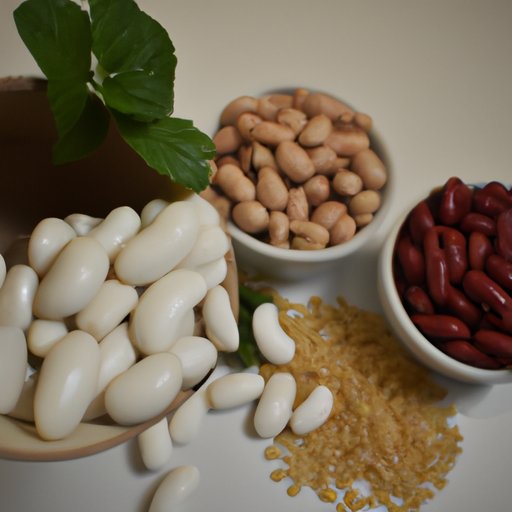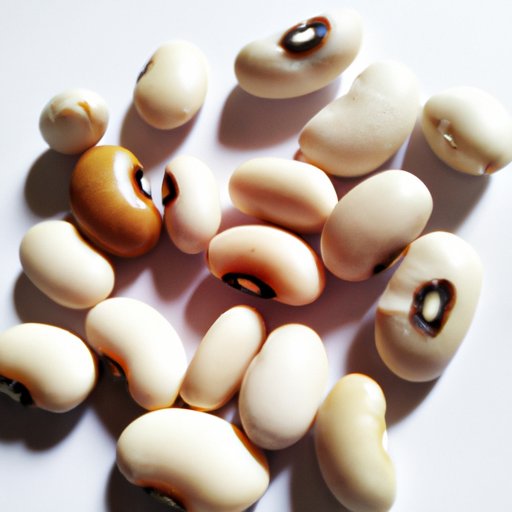Introduction
Beans are a type of legume and one of the most popular plant-based foods around the world. They are a nutritional powerhouse packed with protein, fiber, vitamins, minerals, and antioxidants. Research has shown that eating beans on a regular basis can have numerous health benefits, including improved digestive health, lower cholesterol levels, reduced risk of heart disease, and improved blood sugar control. In addition, beans are low in calories and high in fiber, making them ideal for weight loss. Read on to learn more about why beans are good for you and how to incorporate them into your diet.
Nutritional Value of Beans
Beans are an excellent source of both protein and fiber. A single 1/2 cup serving of cooked beans provides approximately 7 grams of protein, which is equivalent to the amount found in one large egg. Protein is essential for the body to build and repair cells and tissues, as well as produce hormones and enzymes. Fiber is also important for keeping the digestive system healthy and regular. One 1/2 cup serving of cooked beans provides nearly 6 grams of dietary fiber, which is almost 25% of the recommended daily intake.
In addition to protein and fiber, beans are also a good source of essential vitamins and minerals, such as folate, iron, magnesium, potassium, zinc, and vitamin B6. They are also a rich source of phytonutrients and antioxidants, which can help protect against free radical damage and reduce inflammation in the body.
Benefits of Eating Beans Regularly
Eating beans on a regular basis can offer numerous health benefits. Here are some of the key benefits of adding beans to your diet:
Improved Digestive Health
Beans are high in fiber, which helps to keep the digestive system regular and prevent constipation. The insoluble fiber found in beans helps to bulk up the stool and stimulate peristaltic motion in the intestines. This helps to move food through the digestive tract more quickly and efficiently, reducing the risk of digestive issues like bloating, gas, and cramping.
Lower Cholesterol Levels
Studies have found that eating beans regularly can help to lower cholesterol levels. This is due to the high fiber content of beans, which binds to bile acids in the intestines and prevents them from being reabsorbed into the bloodstream. Bile acids are made from cholesterol, so preventing their reabsorption can help to reduce overall cholesterol levels.
Reduced Risk of Heart Disease
In addition to lowering cholesterol levels, beans can also help to reduce the risk of heart disease. This is due to the fact that beans are high in soluble fiber, which helps to reduce inflammation and improve blood flow. Eating beans regularly has been linked to a lower risk of stroke, hypertension, and coronary artery disease.
Improved Blood Sugar Control
Beans are high in both protein and fiber, which can help to improve blood sugar control. Studies have found that eating beans regularly can help to reduce fasting blood sugar levels and improve insulin sensitivity. This can be particularly beneficial for people with diabetes or prediabetes.

How Beans Help with Weight Loss
In addition to providing numerous health benefits, eating beans can also be beneficial for weight loss. This is due to the fact that beans are high in fiber and low in calories. A single 1/2 cup serving of cooked beans contains only 100-120 calories, making it an ideal choice for those looking to lose weight. In addition, the high fiber content of beans helps to promote feelings of fullness, which can help to reduce overall calorie intake.
The satiating effect of beans can also help to reduce cravings and snacking between meals. This can be especially beneficial for those who struggle with late night cravings or emotional eating.

Ways to Incorporate Beans Into Your Diet
Beans are incredibly versatile and can be incorporated into a variety of dishes. Here are some of the best ways to enjoy beans:
Soups and Stews
Beans are a great addition to soups and stews. They can be used to thicken the broth and add flavor and texture to the dish. Black beans, kidney beans, and garbanzo beans are all great options for soups and stews.
Salads
Beans make a great addition to salads. Pinto beans, black beans, and garbanzo beans are all great choices for salads. You can also use beans as a substitute for croutons to add crunch and texture to the salad.
Side Dishes
Beans can be used as a side dish or served with other dishes. Lima beans, navy beans, and black-eyed peas are all great options for side dishes. Beans can also be mashed and seasoned to make a delicious alternative to mashed potatoes.
Main Dishes
Beans can also be used as the main ingredient in a dish. Examples include black bean burgers, lentil curry, and chili. These dishes are flavorful and packed with protein, making them a great option for vegetarian and vegan diets.
Snacks
Beans can also be enjoyed as a snack. Roasted chickpeas are a popular option, but you can also make your own roasted beans by seasoning canned beans with your favorite spices and baking them in the oven.

Different Types of Beans and Their Health Benefits
There are many different types of beans available, each with its own unique flavor and texture. Here are some of the most popular types of beans and their health benefits:
Black Beans
Black beans are a staple in Latin American cuisine and are known for their nutty flavor and creamy texture. They are a good source of protein, fiber, folate, and iron, and are also high in antioxidants. Studies have found that black beans can help to reduce inflammation and improve heart health.
Kidney Beans
Kidney beans are a type of red bean and have a slightly sweet flavor and creamy texture. They are high in protein, fiber, and antioxidants, and are also a good source of iron, magnesium, and potassium. Eating kidney beans regularly has been linked to improved blood sugar control and lower cholesterol levels.
Garbanzo Beans
Garbanzo beans, also known as chickpeas, are a type of legume with a nutty flavor and creamy texture. They are high in protein, fiber, and antioxidants, and are also a good source of folate and iron. Eating garbanzo beans regularly has been linked to improved digestion and reduced risk of heart disease.
Lima Beans
Lima beans are a type of green bean with a sweet flavor and creamy texture. They are high in protein, fiber, and antioxidants, and are also a good source of folate, iron, and magnesium. Eating lima beans regularly has been linked to improved blood sugar control and reduced risk of certain cancers.
Pinto Beans
Pinto beans are a type of brown bean with a mild flavor and creamy texture. They are high in protein, fiber, and antioxidants, and are also a good source of folate, iron, and magnesium. Eating pinto beans regularly has been linked to improved digestion and reduced risk of certain cancers.
Navy Beans
Navy beans are a type of white bean with a mild flavor and creamy texture. They are high in protein, fiber, and antioxidants, and are also a good source of folate, iron, and magnesium. Eating navy beans regularly has been linked to improved blood sugar control and reduced risk of heart disease.
Cooking Tips for Making Delicious Bean-Based Dishes
Cooking with beans is easy and can be lots of fun! Here are some tips for making delicious bean-based dishes:
Soaking the Beans
Soaking the beans before cooking can help to reduce cooking time and make them easier to digest. To soak the beans, place them in a pot and cover with water. Let them sit overnight, then drain and rinse before cooking.
Adding Flavoring Agents
Beans are naturally bland, so it’s important to add flavoring agents to make the dish more flavorful. Herbs and spices are a great way to add flavor without adding calories. You can also use stock, tomato sauce, and other liquids to give your dish more flavor.
Adding Aromatics
Aromatics, such as onions, garlic, and celery, are a great way to add flavor and depth to bean-based dishes. Sauté the aromatics in a little olive oil before adding the beans to the pot.
Using Pressure Cookers
Pressure cookers are a great way to cook beans quickly and easily. Simply add the beans to the pressure cooker with enough liquid to cover them, close the lid, and set the timer. The beans will be cooked in a fraction of the time it would take to cook them on the stovetop.
Conclusion
Beans are an incredibly nutritious food that can offer numerous health benefits. They are a good source of protein and fiber, as well as essential vitamins and minerals. Eating beans regularly can help to improve digestive health, lower cholesterol levels, reduce risk of heart disease, and improve blood sugar control. In addition, beans are low in calories and high in fiber, making them ideal for weight loss. There are many different types of beans available, each with its own unique flavor and health benefits. Incorporating beans into your diet is easy and can be lots of fun. With the right ingredients and cooking techniques, you can make delicious bean-based dishes that are sure to please even the pickiest eaters.
(Note: Is this article not meeting your expectations? Do you have knowledge or insights to share? Unlock new opportunities and expand your reach by joining our authors team. Click Registration to join us and share your expertise with our readers.)
